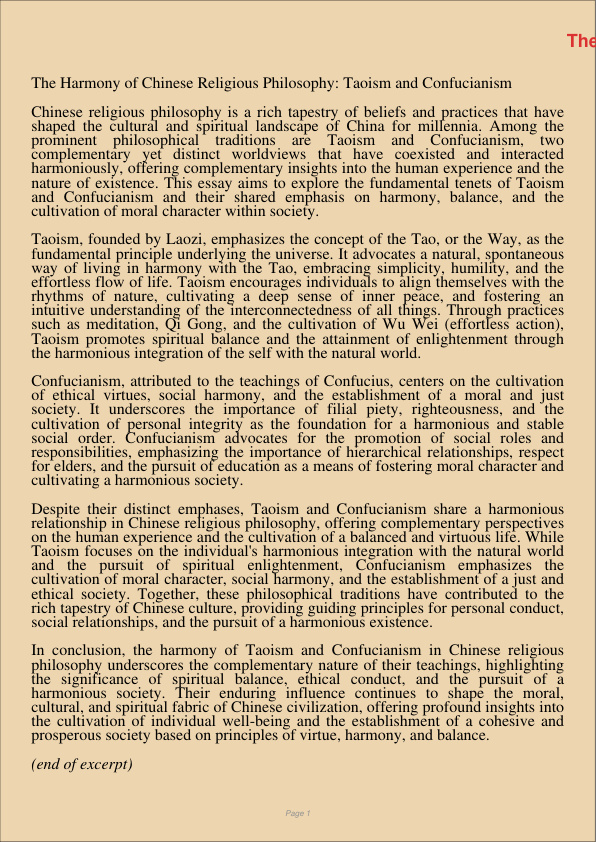The Harmony Of Chinese Religious Philosophy Taoism And Confucianism
Dec 31, 2023
chinese religious philosophy
taoism
Education
Geography

The Harmony of Chinese Religious Philosophy: Taoism and Confucianism
Chinese religious philosophy is a rich tapestry of beliefs and practices that have shaped the cultural and spiritual landscape of China for millennia. Among the prominent philosophical traditions are Taoism and Confucianism, two complementary yet distinct worldviews that have coexisted and interacted harmoniously, offering complementary insights into the human experience and the nature of existence. This essay aims to explore the fundamental tenets of Taoism and Confucianism and their shared emphasis on harmony, balance, and the cultivation of moral character within society.
Taoism, founded by Laozi, emphasizes the concept of the Tao, or the Way, as the fundamental principle underlying the universe. It advocates a natural, spontaneous way of living in harmony with the Tao, embracing simplicity, humility, and the effortless flow of life. Taoism encourages individuals to align themselves with the rhythms of nature, cultivating a deep sense of inner peace, and fostering an intuitive understanding of the interconnectedness of all things. Through practices such as meditation, Qi Gong, and the cultivation of Wu Wei (effortless action), Taoism promotes spiritual balance and the attainment of enlightenment through the harmonious integration of the self with the natural world.
Confucianism, attributed to the teachings of Confucius, centers on the cultivation of ethical virtues, social harmony, and the establishment of a moral and just society. It underscores the importance of filial piety, righteousness, and the cultivation of personal integrity as the foundation for a harmonious and stable social order. Confucianism advocates for the promotion of social roles and responsibilities, emphasizing the importance of hierarchical relationships, respect for elders, and the pursuit of education as a means of fostering moral character and cultivating a harmonious society.
Despite their distinct emphases, Taoism and Confucianism share a harmonious relationship in Chinese religious philosophy, offering complementary perspectives on the human experience and the cultivation of a balanced and virtuous life. While Taoism focuses on the individual’s harmonious integration with the natural world and the pursuit of spiritual enlightenment, Confucianism emphasizes the cultivation of moral character, social harmony, and the establishment of a just and ethical society. Together, these philosophical traditions have contributed to the rich tapestry of Chinese culture, providing guiding principles for personal conduct, social relationships, and the pursuit of a harmonious existence.
In conclusion, the harmony of Taoism and Confucianism in Chinese religious philosophy underscores the complementary nature of their teachings, highlighting the significance of spiritual balance, ethical conduct, and the pursuit of a harmonious society. Their enduring influence continues to shape the moral, cultural, and spiritual fabric of Chinese civilization, offering profound insights into the cultivation of individual well-being and the establishment of a cohesive and prosperous society based on principles of virtue, harmony, and balance.